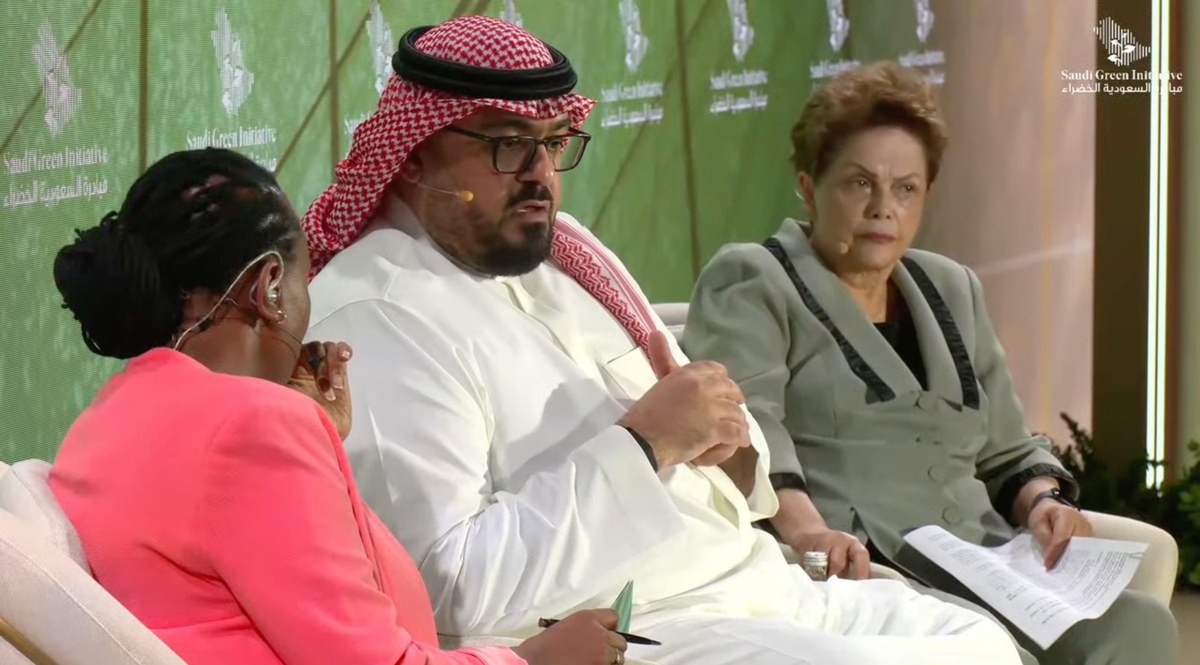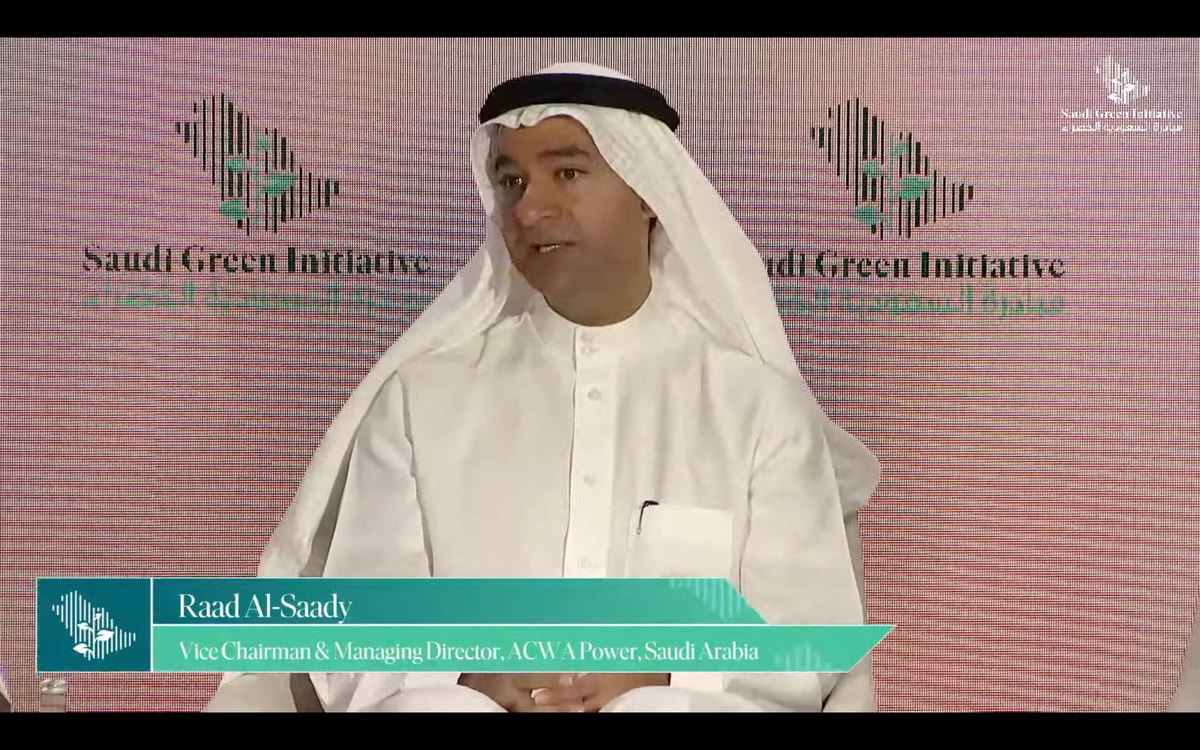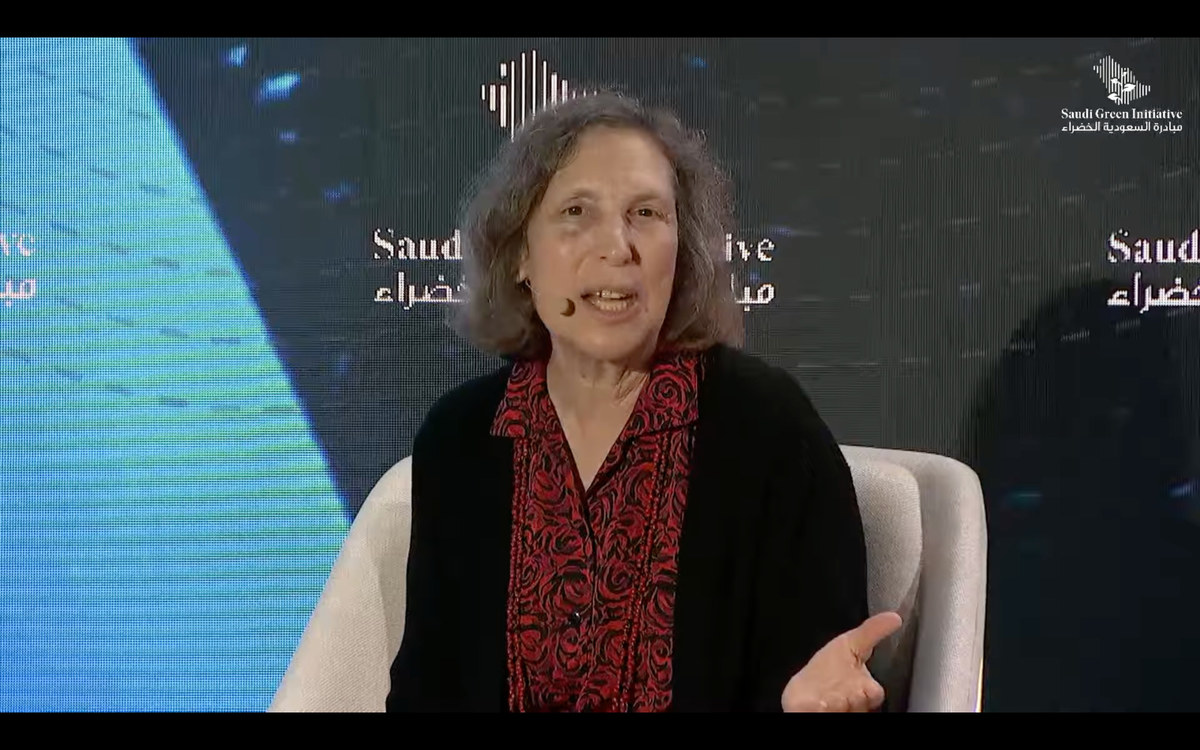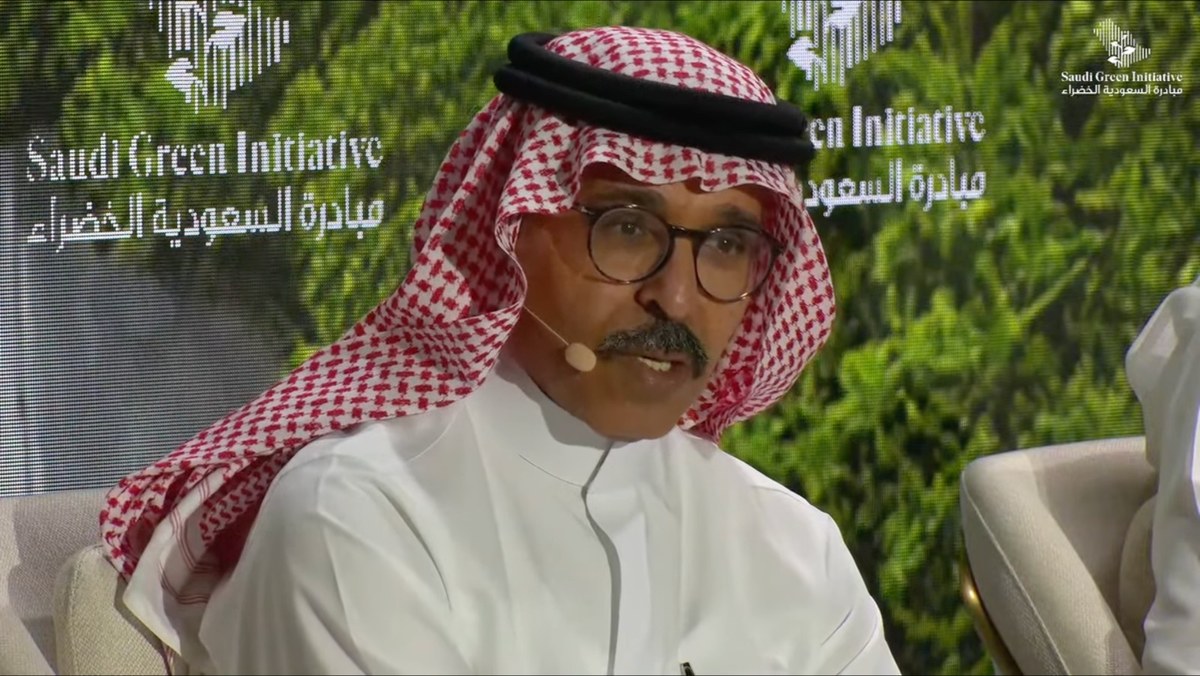DUBAI: The Saudi Green Initiative Forum kicked off on Monday as COP28 continues to mobilize world leaders towards serious action against climate change.
Held under the slogan “From Ambition to Action”, the third edition of the forum discussed critical sustainability, primarily energy transition, protecting the seas, and unlocking climate finance to enable climate action at the UN climate summit.
READ MORE: Click here for our coverage of COP28
----
15.10 GMT
That concludes over coverage of the first day of the SGI Forum. There were many talking points, including how Riyadh is set to transform into a global sustainability hub thanks to substantial investments earmarked to prepare the Saudi capital for the upcoming Expo 2030.
There was also a warning from the Aramco CEO that not enough renewable energy is being produced to meet global demand.
14:50 GMT
David Edmond, CEO of NEOM Green Hydrogen, told Arab News the first phase of his company is focused on exports, as there is not yet a sufficient demand for the fuel in Saudi Arabia. However, he said the Kingdom is at a “turning point” and the next phase will be centered on the local market.
12:50 GMT

Amin Nasser, CEO of Aramco, said the demand for hydrogen power is still not there as it is still an expensive source of energy. He added that there still needed to be investment in oil and gas because there is more demand for those fuels.
Patrick Pouyanné, CEO of TotalEnergies, echoed this by saying that the demand for oil and gas is tied to the global population growth.
12.15 GMT
The success of COP gatherings is often measured, initially at least, in dollars and cents. The Dubai event has so far seen pledges of around $57 billion from various sectors, with commitments covering finance, health, food, nature and energy.
These include:
- $3.5 billion to replenish the Green Climate Fund
- $2.7 billion pledged for health
- $2.6 billion for food systems transformation
- $2.6 billion to protect nature
- $467 million for urban climate action
- $1.2 billion has been committed for relief, recovery and peace.
Read more about the pledges here.
11:45 GMT
Ziyad Al-Shiha, CEO of the Saudi Investment Recycling Company, tells Arab News that vision is not enough. Execution is key to achieve tangible results in the battle against climate change.
11:36 GMT

Dilma Rousseff, President, New Development Bank
“There is a problem in the global south countries: The burden of public death. The public death is rising too much and too fast.”
“Deforestation is a question of will and resources.”
11:30 GMT

Faisal Alibrahim, Saudi Minister of Economy and Planning
“The challenge or the complication is that climate action will require a lot of funding from now until 2050.”
“What we did in Saudi Arabia, to put it simply is Vision 2030. Vision 2030 was our blueprint to diversify our economy, empower the youth and build stronger institutions.”
“Our non-oil economy has grown 20 percent since the start of Vision 2030, which is higher than the EU and the US that stand at around 14 and 10 percent.”
“We’re very experimental. We’re very humble about learning from others experiences including our own experiences immediately after we decide to take an action so I'd say step one is looking inwards, upgrading our institutional capabilities, unlocking the potential that we have in all sectors.”
“We need stable growing economies in order to achieve climate action.”
“I think, from our point of view, the thing that we don’t regret doing is building institutional capabilities and educating people. The more educated people are, the stronger our institutions are in terms of their ability to push the right policy.”
“We have the cleanest oil in the world, being produced in Saudi Arabia. and we still want to be the most reliable and cleanest conventional hydrocarbon energy producer, but also, we have the cheapest wind and solar energy. In Saudi Arabia, we have the largest green hydrogen project in NEOM.”
“Let’ not forget most of the innovation that happened globally came from countries where there was a young population that was serious about making a difference. I think the windfall in our battle against climate change could be coming from these countries.”
11:06 GMT

“In recent years there has been a major transformation to enable investments to be able to de-risk investors investing in IPP projects, particularly renewable projects. This year alone, we have signed 15 power purchase agreements, which would not have been possible without providing the right de-risking mechanisms for investors to feel comfortable that their investments are safe, secure and stable.”
“We do not really have to subsidize renewable energy; it is actually competitive. We achieved the lowest renewable energy prices in the world with Shuaibah at 1.04 cents per kilowatt-hour.”
11:00 GMT

“Ultimately our business of developing renewable energy is you look at projects and attempt to de-risk it as much as possible so you can reach a point where you can pass on the savings to the end user, and you can make these projects affordable and reliable. It is very easy to talk about markets like Saudi Arabia, but if you want renewable energy to be available in many more countries price becomes very, very important. And price is a function of risk, and availability of credit.”
10:36 GMT

Yasir Al-Rumayyan, Governor of the Public Investment Fund
“The Public Investment Fund is the main engine of the Saudi economy.”
“Saudi Arabia last year was the fastest growing in GDP among the G20 member states. We had grown by 8.7 per cent.”
“By the first quarter of next year, we are designing a net zero transition plan. So, we will start to see how we are going to go from the current status quo to the net zero emission.”
“PIF moved from rank 73 to the seventh, among all the other sovereign wealth funds.”
“On the India-Middle East-Europe corridor announced by Saudi Crown Prince Mohammed bin Salman and US President Joe Biden earlier during the G20 Summit: “One of the things that we get to have in the corridor, in addition to the railways and the communication lines, is green hydrogen and renewable energy.”
“We are doing our part, and I hope the rest of the world will do theirs.”
“I think the world should start being more practical to look into the solutions that will make us live a happier and healthier life, not for us only, but for our children and their children and their children's children.”
10:09 GMT

“Sixty percent of the critical variables of climate information come from space. There is a lot of discussion today on how to protect our planet, but also let us think about how to protect critical infrastructure where we get the data to protect our planet.”
“There is also a problem of space debris… these debris moving between around 20,000 and 30,000 kilometers per hour. If we have to protect our investments, we have to address the space debris issue.”
“In Saudi Arabia, we stand with all nations thinking about harnessing the power of space technology to combat the problem of space debris. Realizing the urgency of this global challenge, we have embarked on an ambitious journey to develop and deploy innovative space solutions that will encourage a better sustainable future.”
“We are planning a workshop in the first quarter of next year tackling specifically space debris because we believe this is a global problem and this needs global coordination to fix it.”
“People right now are talking about a new space era, a huge shift from a government-centric space sector to commercialization. Over the last 30 years, we have been tracking over $37 billion direct funding to the private sector, 60 percent of these coming in the last three to four years. There is a huge shift to the private sector to fund and participate in space activities.”
“We understand space economy is a growing economy, 80 percent of that economy would be coming from the downstream [segment] which is easy in capex so the appetite for the private sector and entrepreneurs will be higher. The third thing is the cost of launch: 10 years ago it cost $37,000 to send a kilo into space, now it costs only $1,500 is expected that by 2040 it will be $10 only.”
“There should be innovative regulation, meaning there is cooperation between there regulator and the private sector as well as between the regulator and other agencies. Any ICT regulator should not work independently by itself, in isolation of the private sector or in isolation of another national regulator. There should be a concept of innovative regulation.”
08:47 GMT
Angela Wilkinson, CEO of the World Energy Council, tells Arab News about the impact of Saudi Arabia’s initiatives.
08:34 GMT

Ray Dalio, founder and mentor CIO of Bridgewater Associates, who also founded an ocean exploration organization called OceanX:
“We have discovered in the Red Sea a coral that is estimated to be a thousand years old, we discovered species, remnants of other civilizations. That kind of discovery in the Red Sea, the way it is being done, to work with scientists, it is exciting to see these discoveries. The Red Sea is such a treasured environment that has been underutilized and it will be handed in the most pristine way.”
“The ocean is 72 percent of the world’s surface and twice the size of all continents combined but it remains unexplored. It is the biggest natural resource that we have, it has the biggest effect on our lives, but it is totally ignored. As much as 120 percent times as much money is being spent for space exploration that to ocean exploration. It is much cost effective to go there, ocean exploration.”
“My mission is not only to show [ocean exploration], but to make it infectious. And it is becoming an infectious thing in Saudi Arabia, there will be amazing things that would be done in Saudi Arabia. And then it will be done globally. So my aspiration is to discover and think about the ocean.”
“I want to emphasize that [being custodians of the ocean] do not happen without great partnership. I would say could not getter partnership than in Saudi Arabia in the ways that we are doing it. I think you have to have an excellent leadership of a government to say: how do you make it pervasive?”
08:23 GMT

Dr. Lisa Levin, Distinguished Professor at the Scripps Institution of Oceanography
“Deep-sea is as diverse as ecosystems on land. Each one of this high species diversity. There is a lot of evolutionary novelty down there, that we may be able to benefit from in the form of medicines and pharmaceuticals.”
“In terms of the animal life, the ecology of the deep see, we probably have seen less than five percent after about 150 years or more of exploration. So, there is a lot of exploration left to do.”
“The UN High Seas Treaty to the Rescue of Marine Biodiversity could be a very powerful treaty if nations could be behind it and use it to its full capacity. It creates the opportunity to create vast protected areas. It creates marine resources as the common heritage of mankind, and gives benefit sharing to all nations of the world.”
“So much of the deep sea is pristine, and this treaty will help us keep it that way and prevent it from being a dumping ground or a resource extraction site.”
07:42 GMT

Mohammad Al Tayyar, Program Director, Oil Sustainability Program
“If you focus on the four R’s - reduce, reuse, recycle and remove - you can achieve a lot of your mitigation and abatement activities.”
07:36 GMT
Bandar Alkhorayef, Saudi Minister of Industry and Mineral Resources, reaffirms to Arab News the Kingdom’s commitment towards energy transition.
07:24 GMT

Nadhmi Al-Nasr, CEO of NEOM
“We are starting from zero. We have no legacy. We have nothing to undo. And that’s a blessing, but a big responsibility.”
“First, we want the nature reserve to govern how NEOM will be done. We then immediately decided to make 95% of this whole region untouched nature reserve, which left us only 5% of the whole area to build on to house 9 to 10 million people in it.”
“We need to build the city or this NEOM by having it all energized by renewable energy, which is the base of NEOM.”
“We have hundreds of nationalities in NEOM.
Basically, we have the world in NEOM and I see many of them here. They are scientists, they are engineers, they are here because they are passionate about it. It's not just a job, it's a responsibility.”
07:20 GMT

Princess Haifa bint Muhammad Al-Saud, Saudi Vice Minister of Tourism
“International arrivals grew from around 680 million international arrivals to 1.5 billion, and that number is only going to increase to 1.8 billion by 2030.”
“Those are the types of commitments that we need to start proactively doing, and it starts from a role as individuals, all the way to the rules of the communities, to the roles of government and the roles of private sector alike.”
“Today the world is suffering from over tourism, $1 trillion spent annually is the cost of over tourism. So definitely preserving heritage sites is critical.”
A statement from the SGI team later elaborated on her comments, saying that the Riyadh Sustainability Strategy will see carbon emissions in the city reduced by 50 percent. In addition, there will be SR 346 billion ($92 billion) invested in sustainability initiatives and projects, stimulating the private sector.
07:00 GMT

Khalid Al-Falih, Saudi Minister of Investment
“My key point about sustainability is economic sustainability, and that’s where I think investment comes in.”
“We have global policies, and we’re at COP. This is where global policies are being written and architected.”
“The future is about responsible climate action in the Kingdom of Saudi Arabia.”
“We’re building the world's largest and most ambitious and cleanest green hydrogen project in Neon with a partnership from our leading renewable company, ACWA Power.”
“The Ministry of Energy is keeping Aramco and its trajectory of being the world's lowest emitting company.”
“The Saudi government is a top three on every metric that allows industries and consumers to be as efficient and least emitting as possible.”
“We are under no illusion that that fossil fuels will be switched off, constraining it and allowing us to preserve our hydrocarbons for the future, I think is a gift for us.”
“The kingdom has great endowments. One of them is our hydrocarbon endowment. The next is our location solar wind renewables converging together. Being able to produce green hydrogen blue hydrogen at a fraction of what would it cost at high consumption rates. The third endowment is our young great people who are the most innovative, the most productive, the most loyal, the most patriotic people and the fourth endowment is our private sector.”
“As we move forward, we believe that scaling would be more economical. This is why we have already announced that we are planning to get to 44 megatons of CO2 by 2035, which is almost equivalent to the total capacity in existence today.”
6:53 GMT

Mohammed Alibrahim, Saudi Arabia’s Assistant Minister for Oil and Gas
On balancing out carbon management: “What dictates what solution takes place depends a lot on the circumstances because at the end of the day when you select a solution it has to be the most economical for this location. There is no one path for every one.”
“When you are planning your power sector, you need a baseload and sometimes renewable energy could not provide that baseload and we have to be realistic about it what we’re planning moving forward. We do not see any competition, we believe that all these solutions are necessary moving forward, but what dictates the mix would be different from on country to another.”
On carbon capture scaling: “We understand that different technologies are in different stages of their life right now, but we believe also in paving a level playing field in these technologies. We do not play favorites; we do not say one technology is better than the other. We understand what we need to solve for, and it reduces emissions regardless what technology works.”
6:45 GMT

Adel Aljubeir, Saudi Minister of State and Envoy for Climate
“I believe we can work in terms of carbon capture and sequestration. I believe we can do a lot in terms of how we manage our lives and how we live, how we design our cities to reduce commuting time and to reduce pollution.”
“I believe our approach has to be comprehensive, not just in specific areas, there is room for reducing waste.”
“There is room for increasing efficiencies there is room for planting trees. There is room for combating desertification, there is room for combating plastics, there is room for carbon capture and sequestration.”
“I would say that the approach that we have used in Saudi Arabia is a whole of government all of society approach we don't believe that you can segment different areas we have to work, so to speak on all cylinders.”
“I believe that there's a need to provide resources to countries that have a lack of resources, and also providing them with expertise.”
“I believe we have the financial resources, I believe we're developing the political will in order to put in place ambitious policies and ambitious pathways towards achieving the objectives that we all aspire towards.”
“We have launched more than 80 programs and committed almost $200 billion, 186 to be precise on programs this far. We will continue to see what else we can do.”
“I would say the key elements are open dialogue and trust. And if we have an open dialogue and we have trust, and we can have a rational conversation about how they solve the problems and how we tackle the challenges that we're facing. We can come up with credible pathways forward.”
“The key is to express different opinions and the key is to see how we can all combine our collective wisdom to move forward.”
6:00 GMT

- “I want to celebrate the fact that Saudi Arabia put it on the G7 agenda. Desertification and land degradation is an issue that is affecting millions of people and billions of hectares of land.”
- “It is a real issue and we have to also accept that we need land to have agriculture to have urbanization etc. So how are we going to ensure that our lands are as fertile as possible.”
“The Middle East green initiative that is also Saudi-led is something to celebrate. There are resources, obviously, from the GCF, the Green Climate Fund, etc. But these are small resources, the bigger resources will come from communities themselves.”
05:48 GMT

Dr. Khaled Alabulqader, CEO, National Center For Vegetation Cover Development And Combating Desertification, said Saudi Arabia is taking climate change “very importantly and seriously”.
“The Kingdom has taken big initiatives in the world stage and the local stage and on the regional stage.”
“We have done a very good job in the Kingdom in the last few years, where we reduced the [climate] impacts, especially in the coastal areas, vegetation cover and the rangelands. And now we have a policy to also manage the grazelands where we can convert to organized grazing practices with some incentives given to the local community and people.”
“We encourage the development of NGOs. NGOs are really increasing in numbers in the kingdom. For example, when we started the initiative for a plantation in the Kingdom, in the last two years, we have reached to a number 150,000 volunteers.”
“Land degradation is responsible for the 40 percent of global emissions.”
“We just finished the study and the roadmap for the Kingdom to take on the initiative of planting 10 billion trees from 2024 to 2100.”
05:34 GMT

Jukka Petteri Taalas, Secretary-general of the World Meteorological Organization, said this year would be the warmest year on record, and we have also broken records of main greenhouse gas concentrations of carbon dioxide and nitrous oxide.
Taalas added that sea level rise is affecting this part of the world. “We are seeing more weather extremes, more droughts. This part of the world is very sensitive, people are facing more risks in this part of the world.”
“We know that the biggest problem with climate mitigation is consumption of fossil fuels. That’s two thirds of the problem. Then about 20 percent of the problems related to release of methane, especially from tropical wetlands, from rice paddies and from cattle. And about 10 percent of the problem that we have having in climate is related to deforestation, especially deforestation of the tropical rain forests in Africa, and sub parts of Southern Asia.”
“And we should stop this deforestation and instead, plant more trees is a way to absorb carbon dioxide from the from the atmosphere.”
“Then there’s a second challenge that we are having. It’s the fact that we have started seeing growing amount of dust and sand storms also in your parts of the world and these tree plantation to be one positive act against this growing amount of sand and dust storms. And this as you all know, sand and dust storms are having negative impacts on human health.”
5:00 GMT

Saudi Minister of Energy Prince Abdulaziz bin Salman
During his opening speech, the Saudi Minister of Energy Prince Abdulaziz bin Salman said the Kingdom will work with international partners to develop tech-based initiatives to advance the implementation of effective climate action.
He said the Kingdom’s concrete action on implementing renewables are reflected by its ability to quadruple its capacity from 700 megawatts last year to two gigawatt with more than eight gigawatts of renewable under construction and around 13 gigawatts in various development stages.
“We are also planning to tender an additional 20 gigawatt by 2024 as part of our commitment to accelerate the development to renewable energy project.”
The Kingdom, the minister said, aims to become a key exporter of green hydrogen.
The NEOM green hydrogen project, he said, has successfully completed its initial phase securing investments of about $8.5 billion to produce 1.2 million tonnes per annum.
Through panel discussions, the forum highlighted Saudi Arabia’s projects and initiatives to promote sustainability and mitigate climate action under SGI, which was launched by Saudi Crown Prince Mohammed bin Salman in 2021.
More than 80 initiatives are being implemented to contribute to achieving the SGI’s goals of the Saudi Green Initiative.
SGI Forum is an annual platform convening policy makers, thought leaders and climate experts from around the world to share insights, and discuss the best solutions to reach a more sustainable regional and global future.
It comes this year as the UN climate summit continues with key pledges from world leaders to mobilize efforts to combat the rising threats.
The annual UN Conference of the Parties, known as COP28, in the UAE featured about 150 presidents, prime ministers, royals and other leaders who are presenting their plans to cut heat-trapping emissions and mostly seek unity with other nations to avert climate catastrophe that seemed to draw closer than ever in 2023.




















